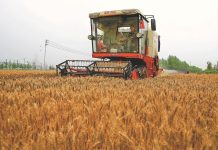CAPE TOWN: South African President Cyril Ramaphosa announced on Monday that members of the public will be able to apply to lease 700,000 hectares of under-utilized or vacant state-owned land in seven of the nine provinces in the country.
Ramaphosa hailed this as a major milestone in the agrarian reform process, which gives effect to the promise of the Freedom Charter that the land shall be shared among those who work it.
Given South Africa’s history, broadening access to agricultural land for commercial production and subsistence farming is a national priority, Ramaphosa said in his weekly presidential newsletter.
As agricultural land is the mainstay of the natural resource base, the availability and sustainable use of farmland to grow crops and for animal husbandry is key to the nation’s survival, he said.
South Africa has vast tracts of land suitable for agricultural production, with 37.9 percent of its total land area currently being used for commercial agriculture.
Although the post-apartheid land reform process has resulted in more land being restored and restituted to black South Africans, the pernicious effects of the 1913 Natives Land Act continues to be in patterns of farmland ownership.
That act went far beyond dispossessing millions of people of their ancestral land, depriving the indigenous people of their right to own and work the land on which they depended for sustenance and livelihood, Ramaphosa said.
This great injustice of the act effectively “engineered the poverty of black South Africans,” he said.
“Its aim was to destroy our people’s prospects for self-reliance, independence and economic prosperity. At the most fundamental of levels, it destroyed our ability to feed ourselves,” the president said.
Like many other countries, South Africa’s arable land is under threat from land degradation, water scarcity and urban encroachment. Prime agricultural land is also being lost through land-use changes.
Transforming patterns of agricultural land ownership is vital not just to address the historical injustices of the past, but is necessary to safeguard the nation’s food security, Ramaphosa said.
The 2019 report of the Presidential Advisory Panel on Land Reform and Agriculture noted that while the country does exports food, 41 percent of people in rural areas and 59.4 percent in urban areas have severely inadequate access to food. Agrarian reform has been a priority of successive administrations since democracy, said the president, noting that between 1994 and 2018 the state delivered 8.4 million hectares of land to previously disadvantaged individuals under the land reform program.–Agencies



